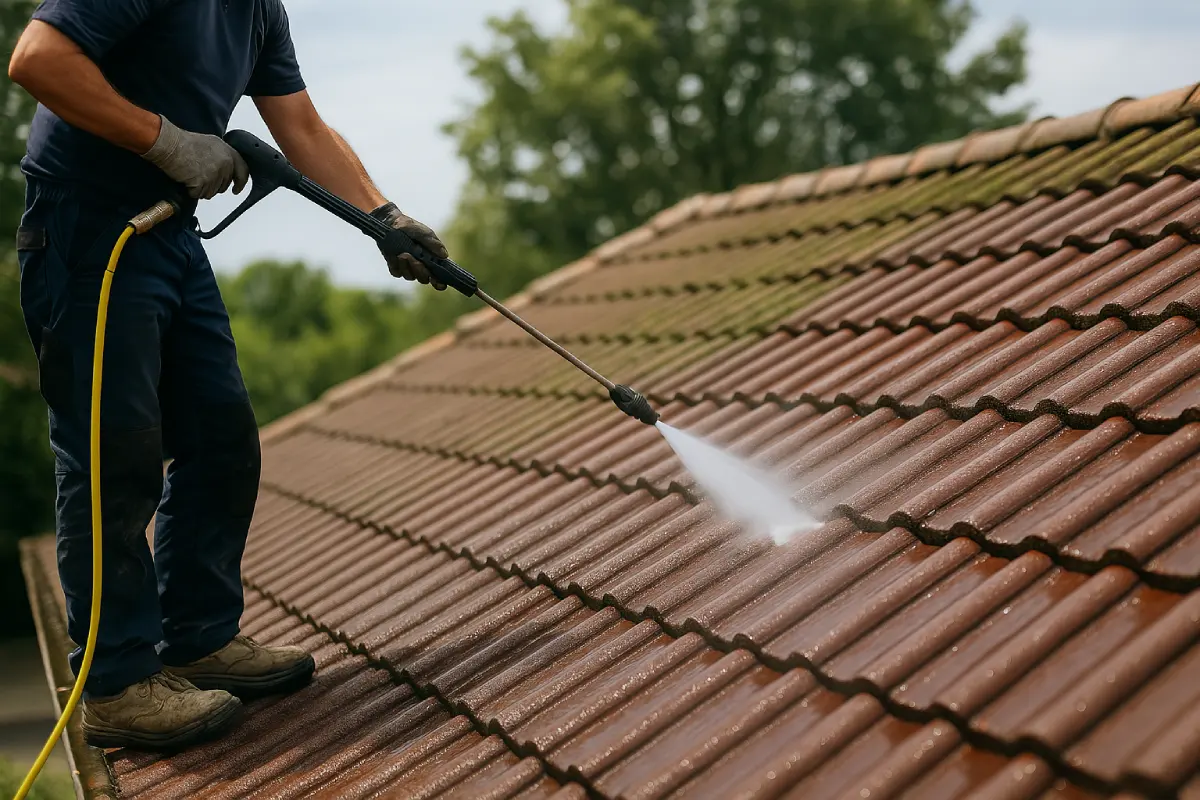Your home’s exterior isn’t just the first thing people notice—it’s also your first line of defense against the elements. Over time, surfaces like your roof, siding, walkways, and driveways accumulate dirt, mold, algae, and other debris. But when it comes time to clean, the question many homeowners ask is: should you go with soft washing or pressure washing?
Understanding the difference between these two techniques is key to preserving your home’s beauty and structural integrity. Whether you’re scheduling exterior cleaning services in your local area or simply curious about the best approach for your roof, this guide breaks down everything you need to know.
What Is Soft Washing?
Soft washing is a gentle, low-pressure cleaning method that relies on eco-friendly detergents to eliminate mold, mildew, algae, and other organic stains. Water is sprayed at pressures typically below 500 PSI, making this method safe for delicate surfaces.
Ideal Surfaces for Soft Washing
- Asphalt shingles
- Tile and metal roofs
- Vinyl and wood siding
- Fences and decks
- Stucco and painted surfaces
Unlike high-pressure methods, soft washing is designed to clean without damaging surfaces. It also offers longer-lasting results by killing spores and organisms at the root level, reducing regrowth.
What Is Pressure Washing?
Pressure washing, sometimes called power washing, uses high-pressure water—often between 1,500 and 3,000 PSI—to blast away dirt, grime, and stains. It’s especially effective for cleaning tough, non-porous surfaces that can withstand the force.
Ideal Surfaces for Pressure Washing
- Concrete driveways
- Sidewalks and walkways
- Brick walls
- Stone patios
- Garage floors
While pressure washing delivers powerful cleaning results, it can be too aggressive for roofs and softer materials, risking damage to shingles or siding if used improperly.
Choosing the Right Method for Your Roof
Your roof is one of your home’s most sensitive surfaces. The wrong cleaning method can lead to shingle loss, water intrusion, and even voided warranties. In nearly all cases, soft washing is the preferred method for roof cleaning.
Why Soft Washing Is Best for Roofs
- Preserves Shingle Integrity: High-pressure water can strip granules from asphalt shingles, weakening them.
- Kills Organic Growth: Algae, moss, and mold thrive in warm, humid climates like Broward County. Soft washing neutralizes the root systems of these organisms.
- Meets Manufacturer Guidelines: Most roofing manufacturers recommend soft washing to maintain warranties and extend roof life.
According to the Asphalt Roofing Manufacturers Association (ARMA), high-pressure washing is discouraged for roof maintenance and can lead to unnecessary wear.
When to Use Pressure Washing Around the Home
While pressure washing isn’t recommended for your roof, it does have its place in an exterior cleaning strategy. Use it to deep-clean your home’s toughest surfaces, such as driveways and sidewalks where years of traffic, oil stains, and mildew can accumulate.
For example, pressure washing can effectively remove embedded grime from concrete that soft washing simply can’t reach. However, it’s important to trust this service to trained professionals. Improper use can damage mortar, etch surfaces, or even cause injury.
Benefits of Hiring Professionals
Working with pressure cleaning experts ensures that the right method is used on each surface of your property. Trained technicians understand how to assess surface material, grime levels, and safety risks to deliver optimal results without causing damage.
If you’re seeking soft washing in Broward County, it’s especially critical to choose a provider that knows how to clean roofs safely and thoroughly in a subtropical environment. Algae and mold thrive in warm, humid air, and an improper approach can make the problem worse.
Professional exterior cleaning services can also:
- Use commercial-grade equipment and biodegradable solutions
- Minimize the risk of property damage
- Extend the lifespan of your roof and siding
- Improve curb appeal and property value
How Often Should You Schedule Exterior Cleaning?
While schedules can vary depending on local climate and surroundings, general guidelines recommend:
- Roof cleaning: Every 1–3 years, depending on algae or moss growth
- Siding and fencing: Annually or biannually, especially if shaded
- Driveways and patios: Once a year or as needed for appearance and safety
Regular maintenance not only protects your investment but also keeps your home looking fresh and inviting.
Environmental Considerations
Another benefit of soft washing is its eco-friendly approach. Many companies use biodegradable detergents that break down safely in the environment. Because the process relies more on chemistry than pressure, less water is needed overall.
Pressure washing, on the other hand, can result in higher water usage and chemical runoff if not managed carefully. Make sure your provider follows local environmental regulations and uses proper wastewater containment systems.
For more guidance on green cleaning methods, visit the EPA’s guide to exterior cleaning.
The Right Method for the Right Surface
In the soft washing vs. pressure washing debate, the winner isn’t always clear-cut—it depends entirely on the surface and the problem you’re trying to solve. But when it comes to your roof, soft washing is the clear, safe choice.
For homeowners in South Florida, choosing trusted pressure cleaning experts like Pivotal Pressure Cleaning ensures you receive tailored care for your home’s unique needs. From your shingles to your sidewalks, they’ll use the right tools, methods, and products to protect your property and restore its beauty.
